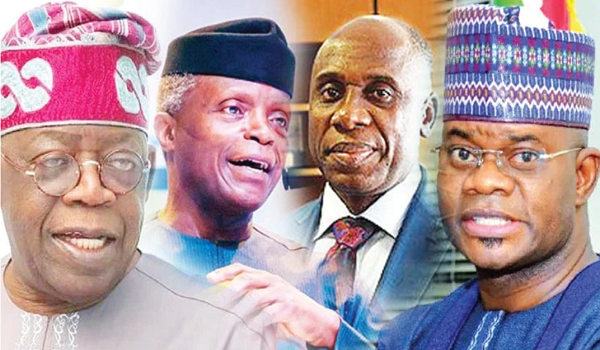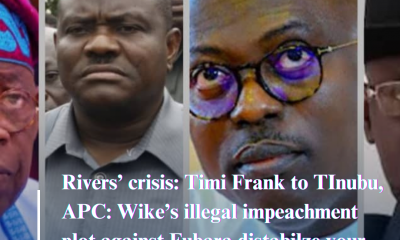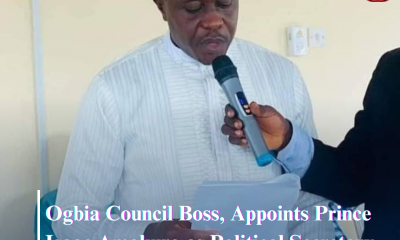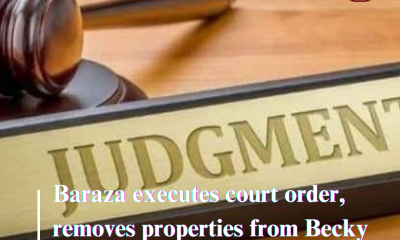Politics
APC presidential primary and scramble for delegates

Delegates to the presidential primary are beautiful brides. No aspirant dare joke with their power to elect or reject. That is why the aspirants are courting them. As accredited representatives, the party is bound by the choice they make on its behalf at the primary. That is the beauty of internal democracy and elective convention.
June 29 is the primary of the ruling All Progressives Congress (APC). But, the race for the ticket started a long time ago. Serious aspirants have deployed their weapons of incisive wit and foresight.
The frontline asoirant is Asiwaju Bola Tinubu. Others eyeing the ticket are Vice President Yemi Osinbajo; Cross River State Governor Ben Ayade; his Ebonyi State counterpart, Dave Umahi; Ekiti State Governor Kayode Fayemi; Kogi State Governor Yahaya Bello; and igawa State Governor Mohammed Badaru.
Others are Senate President Ahmed Lawan, former Minister of Transportation Rotimi Amaechi; former Minister of Niger Delta Godswill Akpabio and former Minister of Science, Technology and Innovation, Dr.Ogbonnaya Onu, former Imo State Governor Rochas Okorocha and former Ogun State Governor Ibikunle Amosun, Pastor Tunde Bakare; former Minister of State for Education Emeka Nwajiuba; former Senate President, Ken Nnamani and former Zamfara State Governor Ahmed Yerima.
Also on the list are Senator Ajayi Borroffice; the only female aspirant, Uju Ohnenye; a pastor, Nicholas Nwagbo; former Speaker of the House of Representatives, Dimeji Bankole; and businessman Tein Jack-Rich.
Feeble-minded aspirants, who chickened out of the race opted for withdrawal because the delegates were not looking in their direction.
Experienced aspirants would have peeped into the future, visualising the titanic struggle, anticipating challenges and sharpening their skills for ‘delegate targeting.’
The hunt for delegates is challenging. Nigetia is a big and diverse country. Mobilisation is a huge task. It is time consuming, energy sapping and highly expensive. The political field is also slippery. The race cannot be a walkover. It will be tough. It could only be dirty. It is the survival of the fittest. The ticket, as it is being said, is not served ala carte.
The presidential convention billed for Eagle Square, Abuja, will only be a climax of scheming, positioning, wheeling and dealing, clash of strategies and meticulous planning by contenders. The anticipated reward for the grand preparation will be victory for the candidate.
The would-be delegates, on their own, put efforts into the struggle to be counted. It constitutes a boost to their political profile and careers, particularly at the grassroots, and non-delegate members of the party envy their transient privileged positions.
Delegates may also be raw materials for political bargaining and sealing of pacts or agreements in the interest of the future. The abrupt withdrawal of an aspirant from the race may momentarily box his loyal delegates into confusion. Some may desert afterwards as sheep without shepherd.
The journey is tortuous. The battles are in layers, starting from the installation of party officers at state congresses. No single aspirant can personally boast of a broad-based support or spread. The secret is bridge-building, nurturing of alliance across zones and states, and consolidation of joint and cross-sectional structures.
Failure at the state congress level to secure input into the emergence of ward, local government and state executive committes of the party may spell doom during the election of delegates for the presidential primary. There is a linkage and bond. That is why an astute aspirant will think ahead.
Those in control of party structures have a comparative advantage and intra-party power and wherewithal to raise delegates for the one day event and singular activity of picking the presidential standard bearer for next year’s election.
The stakes are high. For either consensus, which may be through affirmation, or democratic elective primary, which may involve secret or open balloting, there are two kinds of delegates recognised by the party rules and guidelines.
The first is the privileged cult of super delegates, commonly referred to as ‘statutory.’ They are influential chieftains, including President, vice president, current and former governors and their deputies; National Assembly members, state lawmakers, members of the National Working Committee (NWC) and National Executive Committee, (NEC), and chairmen of councils.
The second are ‘mass delegates,’ otherwise known as ‘elected.’ Only few elected delegates are independently-minded. They are usually under influence of party leaders who threw them up.
The exact number of delegates are unknown, until the list is approved by the party. Even, the names of statutory delegates across the 36 states and the Federal Capital Territory (FCT) is still being collated.
Three chieftains are expected to be elected as national delegates from each of the 774 local governments, making a total of 2,322. If the 18 delegates from six Abuja councils are added, the figure will bee 2,340. Although the number can be determined, it may not be sacrosant because local issues may thwart efforts to choose delegates in some local governments and states, particularly in some crisis-ridden chapters.
According to party sources, over 7,000 delegates are likely to elect the flagbearer. This may be subjective or tentative, until party finally approves the list.
The preliminary breakdown shows that in the Southwest, which is made up of six states, has 1,568: Osun ( 308), Lagos (304), Oyo (29), Ogun (248), Ekiti (216) and Ondo (200).
Southsouth, also with six states, has 919 delegates : Cross River 194, Delta 170, Edo 168, Akwa Ibom 165, Rivers 151, and Bayelsa 71.
The Southeast has 838 from five states; Imo 236, Anambra 163, Ebonyi 154, Abia 154 and Enugu 131.
In the Northcentral with six states, there are 1,278 delegates. Niger has 251, Nasarawa 245, Kogi 222, Kwara 195, Plateau 185 and Benue 180.
The Northwest has 1,924. Kano has 465, Katsina 384, Jigawa 266, Kaduna 234, Kebbi 213, Sokoto 193 and Zamfara 169.
From the Northeast are 1,212 delegates. Borno has 324, Yobe 222, Bauchi 202, Adamawa 184, Taraba 146 and Gombe 134.
Local issues that shaped the outcome of rancorous primaries in criss-ridden chapters may resurface. There may be parallel exercises in some polarised chapters. In anticipation of that scenario, appeal committees will be in place to provide opportunity for ventilation of grievances.
In Rives State, for example, there have been a serious battle for the the soul of APC by two camps, led by Amaechi and Senator Magnus Abe. Although the group led by the former minister is in charge of the party structure, the group led by Abe has not surrendered.
In Osun, where the party structure is controlled by the camp of Governor Gboyega Oyetola, loyalists of Interior Minister Rauf Aregbesola are on the prowl. The battle has been intense, and yet, may be futile.
In Ogun State, while the party machinery is under the grip of Governor Dapo Abiodun, the group led by Senator Ibikunle Amosu is flexing muscles. In the group are Steel and Mines Minister Adegbite, High Commissioner Sarafa Isola and Senator Tolu Odebiyi.
The crisis rocking the Kwara chapter has not fizzled out. It has subsided. But, it may rear its head due to the battle for national delegates, unless combatants in the feuding camps of Governor AbdulRahman AbdulRasak and Information and Culture Minister Lai Mohammed sheath their swords.
What will make Zamfara APC to be on the same page ahead of the presidential convention is the sustenance of the current peace deal characterised by the concessions to the Senator Abdulaziz Yari and Senator Kabiru Marafa camps.
In Imo, the feud between Governor Hope Uzodinma and his rival, Senator Rochas Okorocha, may escalate as the battle for delegates rages.
In Kaduna, the tension that gripped the chapter seems to be fading, following the defection of Senator Ibrahim Shekarau, who had been at loggerheads with Governor Abdullahi Ganduje, who controls the party apparatus.
For a candidate to emerge, he must pull the highest number of delegate votes at the convention. It will not be a tea party.
-

 News3 days ago
News3 days agoFamily, Friends Celebrate Jailed Former Deputy Senate President, Ike Ekweremadu’s Birthday
-

 Niger Delta6 days ago
Niger Delta6 days agoNiger Delta Stakeholders Accuse Olu of Warri and PINL Management of Dishonesty Over Terminated Pipeline Contract
-

 Politics3 days ago
Politics3 days agoPROPHESY TO PRESIDENT BOLA AHMED TINUBU ABOUT 2027
-

 Politics7 days ago
Politics7 days agoRivers’ crisis: Timi Frank to TInubu, APC: Wike’s illegal impeachment plot against Fubara distabilze your administration
-

 Politics7 days ago
Politics7 days agoOgbia Council Boss, Appoints Prince Isaac Amakuro as Political Secretary
-

 News7 days ago
News7 days agoBaraza executes court order, removes properties from Becky father’s residence
-

 Business3 days ago
Business3 days agoBaraza: Bribena pleads for understanding, highlights solutions to organization’s problems
-

 Business6 days ago
Business6 days agoWema Bank Unveils CoopHub, Nigeria’s First Digital Platform for Cooperative Societies




